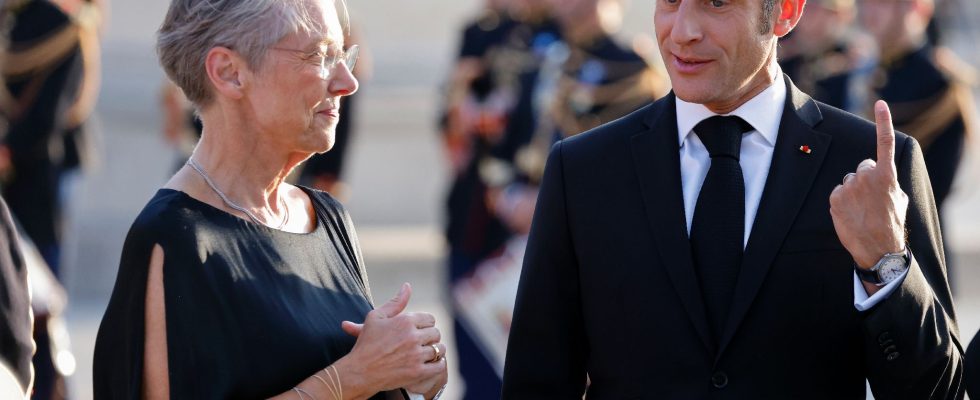Emmanuel Macron took advantage of his “hundred days” to give birth to a new “at the same time” that could not be more Jupiterian: adjust and strengthen his government, yes; adjust and strengthen its Prime Minister, no way. The reshuffle announced by a simple press release from the Élysée this Thursday evening around 8 p.m., as well as the days which preceded it, embodied the presidential desire not to sanctify this change of team, to promote a form of continuity: “Emmanuel Macron wants to show that it was not a zero year and demonstrate that he is the godfather of everything”, whispered one of his unofficial advisers recently.
Pragmatically, the Head of State has resolved to get out of the system the already rusty links in the government chain: the Minister of Education Pap Ndiaye and that of Health François Braun, each responsible for the two main pillars on which Emmanuel Macron intended to rest his second five-year term, were thanked and replaced by two trusted men, the political nugget Gabriel Attal and Aurélien Rousseau, the former chief of staff of Elisabeth Born and in Matignon. The same goes for the Ministers of Housing and Solidarity, Olivier Klein and Jean-François Combe, who have never managed to take the measure of their morocco and to embody their action. The Minister of Associative Life Marlène Schiappa, weakened by her media escapades and the case of the allocations of the Marianne fund, logically took the door after six years of good and loyal service.
Beyond these imperatives, the new government architecture has everything of a transition team, assumed by the entourage of the president at the Élysée who refuses the term “reshuffle”. From there to say that Emmanuel Macron wants to save time, there is only one step. The big maneuvers are to be reserved for the big events: who knows what the political context will be at the end of the summer or if the next vote of the Budget will not give birth to a motion of censure adopted. “You have to see it as the first phase of a next movement which will take place in the fall, when it will be tense, because we are not immune to an accident”, we say in the corridors of Renaissance. “In short, he wants to keep a cartridge”, summarizes a pillar of the majority, as much for the members of the government as for Elisabeth Borne.
Already, at the beginning of the week, the announcement of the maintenance of Elisabeth Borne at Matignon by “off” in the press of “the entourage of the head of state” had been translated, in the four corners of Macronie, as a symbol notable of the state of mind in which the tenant of the Elysée was located. As Politico revealed on Tuesday morning, Emmanuel Macron did not wish to accept the resignation of his Prime Minister to better rename her in stride, a practice that is however common. This double lack of solemnity illustrates the president’s desire not to open a whole new chapter of government action, nor to take the risk of modifying the relationship he has with the Matignon tenant, especially if this is to his advantage… In summary: ostensibly consolidating it was not an option.
Elisabeth Borne was pushing for a much broader overhaul
After so much institutional elegance, Elisabeth Borne was determined not to stop there. To relegitimize yourself – since you are never better served than by yourself, especially at Matignon – the Prime Minister pushed for a much broader reorganization, on which she could put her paw and thus give the signal for a new era. The two heads of the executive met several times this week to discuss it. Negotiate. “All these negotiations were aimed at stabilizing a government team, which the Prime Minister wanted to radically overhaul when the President of the Republic did not have the same idea at all, confirms a regular interlocutor of Emmanuel Macron. Substantial changes would have given Élisabeth Borne a life expectancy of 18 months and the president did not seem enthusiastic about the idea of giving him this blank check…” In addition to his former chief of staff and the appointment of Aurore Bergé to Solidarity, with which she maintains excellent relationships, this famous paw is very difficult to detect…
Since the election of Emmanuel Macron in 2017, ministerial reshuffles and other technical alterations have always given pride of place to majority deputies deemed talented by the two heads of the executive. The “adjustments” of the day are no exception to tradition: the Élysée and Matignon dug into the parliamentary swamp to plug the holes left by the departures of Jean-François Combe, Olivier Klein, Jean-François Carenco and the Modem Geneviève Darrieussecq.
Thus, the now ex-president of the Renaissance group Aurore Bergé finally holds her ministerial portfolio; Sabrina Agresti-Roubache, close to the Macron couple, takes over the Ministry of the City; Thomas Cazenave replaces Gabriel Attal in Public Accounts; Fadila Khattabi is entrusted with Persons with Disabilities; Renaissance spokesperson Prisca Thevenot the Youth portfolio; and, since the Modem lost a soldier in the quota negotiated by François Bayrou, Philippe Vigier was appointed in charge of Overseas. Suffice to say that the reshuffle of the day seems, moreover, to sound the death knell for recruitment within “civil society” and to turn to the faithful. A way for Emmanuel Macron to secure his summer; but what about Elisabeth Borne?
